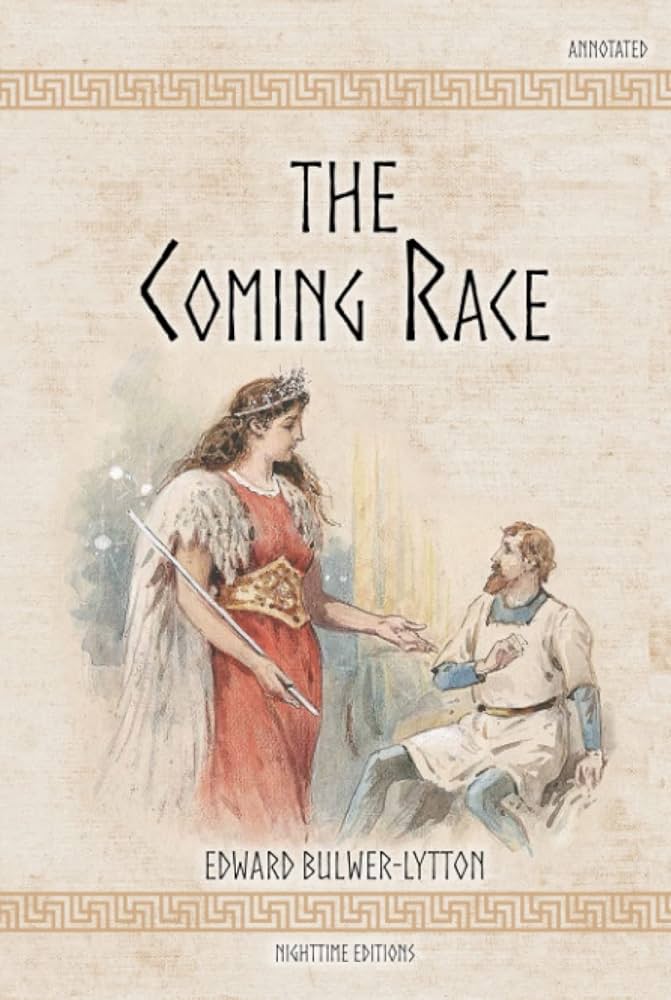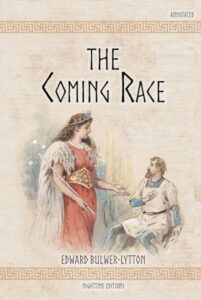Chapter XIV — The coming Race
byChapter XIV presents a profound look into the spiritual and moral outlook of the Vril-ya, whose view of existence stretches beyond the limits of physical life. They believe that once life is granted, it cannot be extinguished—it merely transforms. This transformation does not happen again on Earth but in other planes or realms where each stage offers greater consciousness, joy, and refinement. Such a belief rejects reincarnation as traditionally imagined, replacing it with a concept of perpetual ascent. The soul’s journey, in their eyes, is not cyclical but upward. Suffering, loss, and even death are seen as temporary shadows cast upon an unfolding, eternal light.
Their understanding of divine justice is equally expansive. Rather than imagining a remote deity allowing harm through indifferent laws, they view the Supreme Power as deeply aware of every being’s path. Justice, they say, is not always visible in this life, but it is guaranteed in the total scope of existence. Each hardship is part of a correction, not a punishment. From the smallest insect to the most sentient mind, all experience is overseen by a wisdom that adjusts and elevates. Their theology dismisses randomness as illusion and perceives every outcome as meaningful within an eternal continuum. Evil, then, is not denied—but redefined as a condition temporarily necessary for deeper alignment with truth.
This outlook shapes their way of living. Because they believe every creature possesses a sacred thread of purpose, they show reverence toward all life. Animals are not exploited, plants are cultivated with care, and conflict among sentient beings is considered a sign of moral immaturity. Their cities, homes, and customs reflect this spiritual architecture. Authority is exercised not through domination but through insight. The wealthier do not rule the poorer; they simply carry more responsibility. Harmony is upheld by the belief that justice is not man-made but divinely guaranteed—so peace must be practiced here and now, in preparation for what follows.
Aph-Lin and Zee share these beliefs without fanaticism. There is no need to convince, only to explain. Their faith has no rituals, no churches, no priesthood—it exists in their decisions, their architecture, and even their gestures. To them, kindness is theology enacted. The social equality among the Vril-ya is not idealistic but logical: if all life proceeds toward higher forms, no one is lesser in worth—only at a different phase. Their belief grants dignity to all positions in society, regardless of wealth or physical power. Compassion becomes not just moral, but reasonable. Even their technological superiority is moderated by humility, knowing that all strength must serve the collective ascent.
This belief in individual evolution, spanning across unknown futures, eliminates the need for competition. Progress is internal. The race is not against others, but toward clarity and self-awareness. Thus, they view ambition—so dominant in the upper world—as a residue of misunderstanding. Seeking fame or domination is like trying to rule over one’s shadow. True honor, they suggest, lies in mastering the self. Their worldview discourages cruelty because they see no separation between the soul of a bird and the soul of a man—only differences in development. Respect, then, becomes instinctive, not enforced.
What impresses the narrator is how these ideas filter into daily life. Unlike abstract creeds above ground, the Vril-ya’s beliefs are practical and lived. Their restraint in using vril power, their refusal to exploit animals, and their commitment to fairness in public systems all stem from this spiritual logic. One does not need to believe as they do to admire the results. The narrator, though skeptical, cannot deny the elegance of a society that functions so smoothly. Where human civilizations argue about rights, the Vril-ya act on them. Where others punish, they prevent. Their god is not angry or aloof—it is present in every action taken with wisdom and mercy.
In these reflections, the narrator sees not just a difference in belief, but a mirror held up to humanity’s flaws. The Vril-ya challenge the assumption that suffering is unavoidable and hierarchy inevitable. They suggest that with enough understanding, even power can serve peace. And that perhaps, civilization’s final goal is not conquest or invention, but the creation of a society so just, even its quietest member feels sacred.


